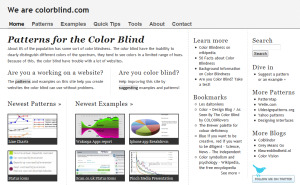Tom van Beveren from the Netherlands put together a very comprehensive site on all sorts of stuff people should know, if they want to build/design a website which doesn’t exclude colorblind visitors. Because almost 5% of all people are suffering from some form of color vision deficiency, this is something every web publisher should care about.
The site We are colorblind.com includes a lot of very interesting topics related to color blindness on the web. It is structured as follows:
Patterns for the Color Blind:A list of very useful patterns you can follow while you’re designing your web content. If you follow those patterns, colorblind people will definitely find their way around on your page.
Quick Tips: This section provides supportive information for all the patterns from the above mentioned list. If you dig into the quick tips you’ll learn more on how color blind people see the world and how you can use this information.
Color vision and web Tools: Hopefully this is an ever growing list of great tools to help you while you are building your web site or just on your way through the web.
Good and bad online Examples: The examples section gives a good overview of good solutions, which help people with color vision deficiency. The list also includes bad examples; web sites unusable by color blind visitors.
If you think about building a new web page, redesign your site or get your online content ready for colorblind visitors, make sure you visit wearecolorblind.com and follow the tips and patterns provided by Tom.


"Because almost 5% of all people are suffering from some form of color vision deficiency, this is something every web publisher should care about."
ReplyDeleteBut weakness to a colour is more common than blindness, as for good and bad examples, I do note that green-weak people.
Is it also important that a website design not exclude those with marginal visual acuity (20/40 or greater but less than 20/20) as this seems to also be quite common? I belive that visual acuity can also, at least in part, be genetically determined.